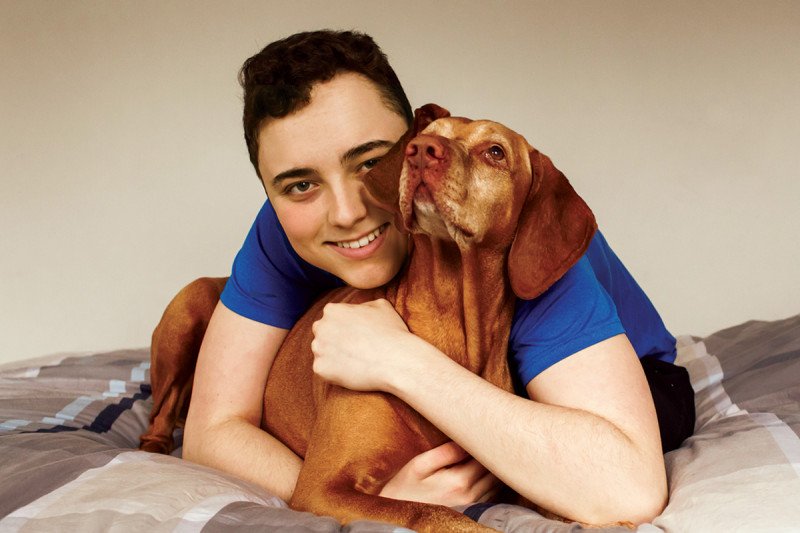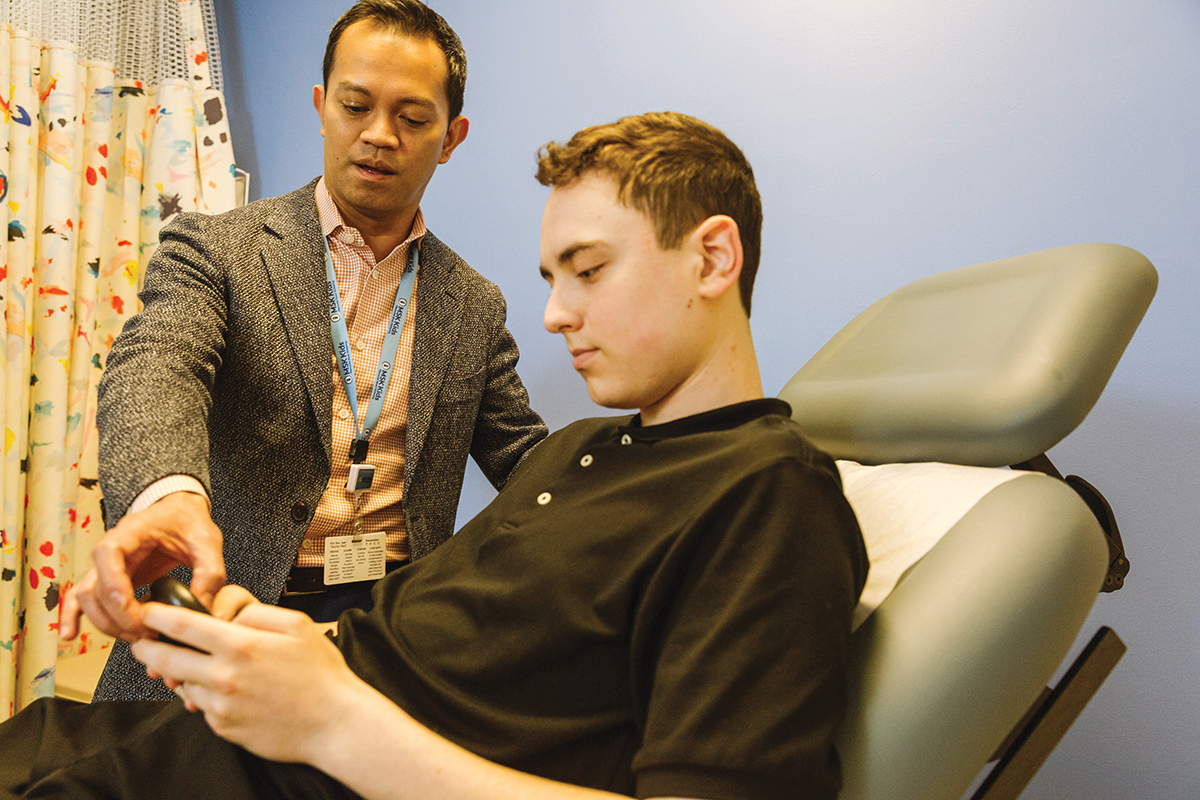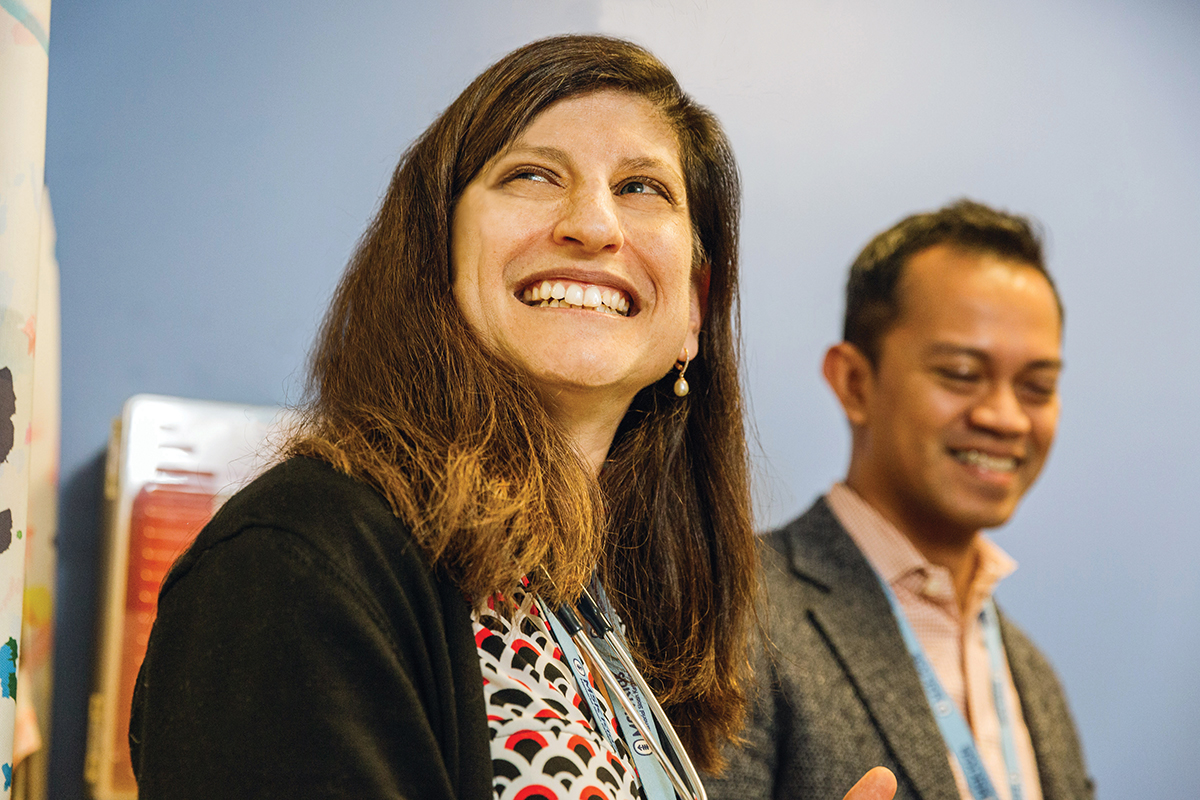
“You guys went bold,” Dave Jeffrey says to MSK Kids pediatric sarcoma specialists Julia Glade Bender and Filemon Dela Cruz, as he beams over his son Joey. “What you’ve done for us is remarkable.” Dave, Joey, mom Chrissy, and younger brother Jake are visiting the doctors for a routine checkup, which seemed unfathomable one year ago.
At 13, Joey developed an adrenal cortical carcinoma, a cancer that usually strikes adults. It started in his abdomen and spread to his lungs. His parents sought help at two hospitals in two states but did not get the answers they were looking for: Both hospitals refused to operate because they deemed the surgery too risky.

After a call to Memorial Sloan Kettering in 2018, the family finally got the help they had been desperately seeking. Pediatric surgeon Michael La Quaglia agreed to do the surgery. He was able to remove the abdominal tumor as well as a tumor in Joey’s right lung.
The surgery was a critical first step, but Joey’s disease continued to progress. He moved on to chemotherapy. Even after six rounds, the cancer proved relentless. “The tumors never really got any smaller,” Dr. Dela Cruz recalls. “They slowly got bigger.”
Joey’s tumor type was rare in children — so rare that his care team wanted to find out exactly how it had developed and if other treatments might put him into remission. It was a case for an in-house team of disease detectives at MSK known as the Pediatric Translational Medicine Program (PTMP). Its members, who come from both medical and research teams, banded together to get to the bottom of Joey’s illness. This kind of collaboration is the hallmark of the PTMP: Pooling resources from a diverse set of teams, with the goal of finding a cure for every child.
Hints of Hope
Step one for the PTMP in gathering clues is genetic testing of a child’s tumor using MSK-IMPACT™. This advanced diagnostic tool looks at the 468 genes most commonly mutated in cancers. The results give MSK care teams insight as to whether such traditional treatments as surgery, chemotherapy, or radiation will be enough to wipe out the disease or if a novel therapy is a better approach.
MSK Kids unites people, science, and care to support our youngest patients and their families. Read more about the new identity for MSK’s world-renowned pediatrics program, which debuted in 2019.
Joey’s MSK-IMPACT results didn’t offer many hints. So the investigators in the PTMP tried whole-genome sequencing for additional insight. In this technique, all of the genetic material in the cancer is looked at comprehensively. While MSK-IMPACT is usually covered by insurance, whole-genome sequencing at MSK Kids has been made possible through philanthropic and research support.
Joey’s whole-genome sequencing held the key to what his doctors thought could be a breakthrough. The test showed that the many mutations in the tumor made him a candidate for a promising type of immunotherapy called checkpoint inhibitors. These drugs rev up the body’s immune system, allowing it to better target and attack the cancer cells. “Tumors with extremely high numbers of mutations, like Joey’s, have been shown to respond to checkpoint inhibitors,” Dr. Dela Cruz adds.
A New Approach

In January 2019, Joey started on a checkpoint inhibitor called pembrolizumab (Keytruda®). Unfortunately, the medicine didn’t work quite as well as they had hoped.
“Faced with slowly progressive disease and the belief — and hope — that his tumor should respond to checkpoint inhibitor therapy, we suggested giving Joey a combination of immunotherapies,” says Dr. Dela Cruz. The team had only anecdotal evidence it would work. But Joey and his family jumped at the opportunity.
“I wasn’t nervous at all,” Joey says. As he reflects back on that decision, he blows up a latex glove, filling it like a balloon. “I wanted to do whatever it took for me to feel better,” he adds.
After Joey completed two rounds of a combination of two immunotherapy medicines, the cancer had all but disappeared. “When I opened the scans, I thought I had the wrong patient file,” Dr. Dela Cruz recalls. “There was a dramatic response. It was hard to believe.”
“Discovery Mode”
Joey’s experience is helping more members of the PTMP make other important advances for MSK’s youngest patients.
“We’re in discovery mode every time we look at changes in these genes,” says geneticist and pediatric oncologist Michael Walsh, another member of the PTMP. He not only treats children with cancer and those who have a pre-disposition to cancer but he also studies mutations that may cause the disease. “When we take a deep dive and look more broadly, we can discover new things,” Dr. Walsh remarks.
Philanthropy provides critical support for pediatric cancer care. Meet one mom who has made it her mission to help other doctors, researchers, and families facing pediatric cancer, one donation at a time.
Computational biologist Elli Papaemmanuil leads the bioinformatics component for the PTMP. Her team combines math, computer science, and genetics to analyze large amounts of data in order to characterize the makeup of a patient’s cancer. The findings provide clues into a patient’s diagnosis and the likely risk of the patient having inherited any cancer-causing mutations from a family member, as well as inform potential treatment options. Her team’s work was especially helpful in determining Joey’s care plan.
“Our preliminary data have opened our eyes to the diversity and complexity of pediatric cancers and how important it is to look at the entire genome to inform our care for children,” she says.
One Step Further
At MSK Kids, the ripple effect of treatment and care goes far beyond one family. The PTMP, MSK’s Department of Pathology, and the Sloan Kettering Institute’s research-based Antitumor Assessment Core often work together to create an exact replica of a child’s tumor, using samples from their actual cells or tumor tissue. MSK teams test this replica against various drugs, at different doses, to see how it behaves. They can then form hypotheses about how the child’s tumor will respond. But that’s not all. “These models teach us many things, even beyond just a single patient,” says Dr. Dela Cruz. “What we learn from every child can help future generations.”

The excitement spreads as the groups share their findings across MSK. One particular goal? To match the discoveries to a patient who could benefit from them. That means sometimes a clinical trial here at MSK will have just one enrollee. This requires strong support from the US Food and Drug Administration and a pharmaceutical company willing to offer the drug to just one person. But the payoff is huge: So far, five single-patient use (SPU) clinical trials at MSK have advanced to full-fledged studies offered at MSK and elsewhere, with new discoveries unfolding at every turn.
“We always collect a lot of data when we do SPUs, so we can learn as much as possible about how and why these drugs work or don’t,” says Dr. Glade Bender. “Because we collect so much information with them, they can eventually lead to clinical trials that may be expanded to other hospitals.”
When a medicine gets approved after such rigorous testing, it’s a watershed moment for young people everywhere who need it. It’s a “think local, act global” approach that is bringing hope to kids at MSK — and beyond.
A Bright Future
The combination of surgery, chemotherapy, and immunotherapy medications was difficult for Joey. Immunotherapy, especially, was not easy — he developed fevers, low blood counts, and autoimmune hepatitis, which is when the immune system attacks the liver. But thanks to MSK’s expertise in immunotherapy, his team knew how to manage these side effects. And Joey says he found positive moments to hang on to. He passed the time by watching movies, taking walks, and playing video games with his friends. Jake was “always by his side to cheer him up,” says Chrissy. He also attended a Major League Baseball game as part of a partnership with the New York Yankees that raises funds for MSK Kids. He even got a signed baseball from star right fielder Aaron Judge.
“Immediately, I felt comfortable at MSK,” Joey recalls. “MSK is my home away from home.”

Today, after completing all of his treatments, Joey shows no evidence of disease. A high school freshman, he comes to MSK Kids to see Drs. Glade Bender and Dela Cruz every few months for a checkup. His parents are grateful they finally got the answers they needed at MSK — although Joey says he had a good feeling about the hospital when he walked through the doors.
As Chrissy recounts it, “The first day Joey came here, he said, ‘Mom, it’s OK now. I’ll hopefully be able to help a lot of people.’”
By helping to further the research into childhood cancer, he’s doing just that.





